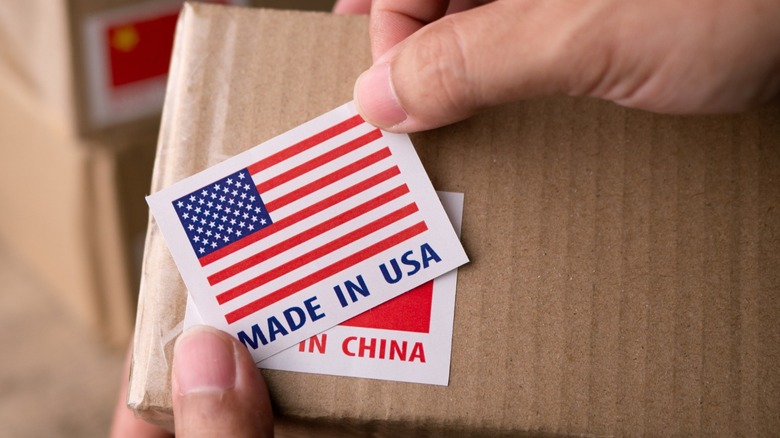Our Terms & Conditions | Our Privacy Policy
These Oil Filters Aren’t Made In America Anymore

Tawan Ramtang/Shutterstock
For decades, buying an oil filter from brands like FRAM, Purolator, or Ford’s own Motorcraft meant you were getting something made on American soil. But lately, more and more consumers are flipping those boxes over and discovering what many view as a quiet betrayal stamped in tiny letters: “Made in Mexico” or “Made in China.” In an era where buying American has taken on renewed cultural weight and concerns over auto part tariffs abound, these once proudly domestic brands have found themselves under scrutiny for either fully or partially offshoring production on the down-low.
On forums like Bob Is The Oil Guy and Reddit’s r/MechanicAdvice, longtime loyalists of American legacy brands are voicing their concerns over declining quality, loss of brand integrity, and the influx of counterfeits. We’re covering three of the big ones you may have heard of who’ve been called out for no longer making their products in the U.S.
FRAM

ZikG/Shutterstock
Founded in 1934 in Providence, Rhode Island, FRAM was once synonymous with American-made quality in oil filtration. Its iconic orange filters lined auto parts stores for decades, with many drivers and mechanics trusting the brand not just for performance, but for its domestic production roots. But as often happens in the land of capitalism, FRAM’s ownership path took a distinctly corporate turn through a mind-bogglingly complex series of mergers and acquisitions.
Acquired by Bendix in the late 1960s, FRAM was later absorbed by AlliedSignal, which then bought aerospace giant Honeywell and adopted its name. Honeywell eventually sold its entire consumer products division (including FRAM) to New Zealand-based Rank Group in 2011. From there, the filter brand landed under the First Brands Group (formerly Trico Group), which is headquartered in Rochester, Michigan.
Though technically now back in the hands of a U.S. company, FRAM’s production has undeniably globalized over the past decade. According to reports in some online discussion groups, and even some online product listings found at popular places like Walmart, you may see filters coming from China or Mexico. Take a look next time you’re browsing the aisles.
Purolator

Ken Wolter/Shutterstock
Purolator, short for “pure oil later”, has a deep American lineage, founded in 1923 through a collaboration between U.S. inventors Ernest Sweetland and George H. Greenhalgh. Being technically the first, it was a go-to name for oil filters made in America for a long time. The company was passed around like a hot potato through various U.S. corporations well into the late 1990s before being acquired by ArvinMeritor (then just Arvin) from Mark IV Industries. The last big shift happened in 2006 when it was purchased in a joint venture by Bosch and Mann+Hummel, a German filtration conglomerate who also owns popular brand WIX, marking a pivotal shift in ownership and production strategy. Today Mann+Hummel maintains full ownership of the Purolator brand, having bought Bosch out of the deal in 2013.
While Purolator continues to operate a major manufacturing facility in Fayetteville, North Carolina, some of its products sold in big-box stores and online are now believed to be sourced or assembled overseas based on various one-star reviews with photo evidence on Amazon and even Advance Auto Parts.
This blending of domestic and international sourcing has sparked debates online where diehard loyalists lament the erosion of Purolator’s all-American identity. Although Purolator still markets itself as U.S.-made, the lack of transparency around which filters are foreign-made has stirred skepticism and frustration among long-time users.
Motorcraft

Norte Photo/Getty
It’s pretty narrow to think of Ford as a distinctly American company at this point, especially since they’ve actually been producing in Mexico since 1925. But as Ford’s official parts division, Motorcraft has long enjoyed a reputation as the gold standard for OEM-quality filters: American-made, factory-spec, and trusted by loyal Ford owners. However, even this bastion of domestic credibility hasn’t escaped globalization.
Ford, like other automakers, has increasingly outsourced parts manufacturing to reduce costs and streamline supply chains. In recent years, Ford’s global procurement strategy has shifted many components to international vendors. While the quality may still meet Ford’s specs (which isn’t saying much considering its recall history), the country-of-origin shift for many parts has prompted unease among buyers committed to supporting American manufacturing. What’s worse, there have been reports by people purchasing products online of Chinese counterfeits being passed off as genuine Motorcraft filters by shady resellers. Forum users seem to be split over whether Ford’s oversight can be trusted, and whether it truly counts as American-made when it’s owned by a multinational conglomerate.
[ad_1]
Images are for reference only.Images and contents gathered automatic from google or 3rd party sources.All rights on the images and contents are with their legal original owners.
[ad_2]



Comments are closed.